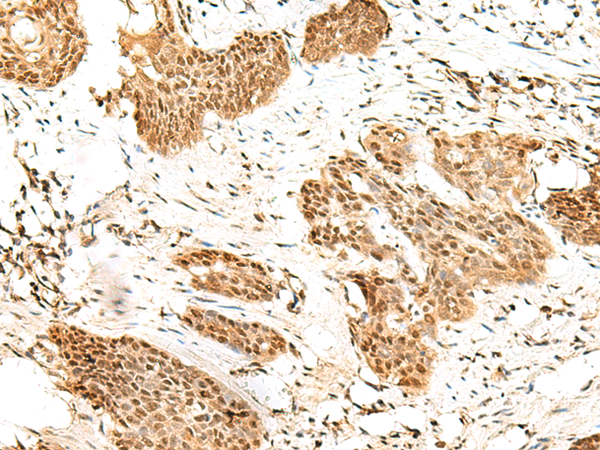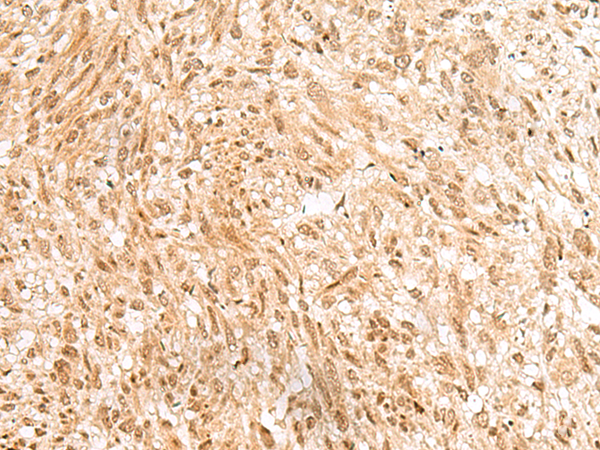

| WB | 咨询技术 | Human,Mouse,Rat |
| IF | 咨询技术 | Human,Mouse,Rat |
| IHC | 1/40-1/200 | Human,Mouse,Rat |
| ICC | 技术咨询 | Human,Mouse,Rat |
| FCM | 咨询技术 | Human,Mouse,Rat |
| Elisa | 1/5000-1/10000 | Human,Mouse,Rat |
| Aliases | Mrd1 |
| Host/Isotype | Rabbit IgG |
| Antibody Type | Primary antibody |
| Storage | Store at 4°C short term. Aliquot and store at -20°C long term. Avoid freeze/thaw cycles. |
| Species Reactivity | Human, Mouse |
| Immunogen | Fusion protein of human RBM19 |
| Formulation | Purified antibody in PBS with 0.05% sodium azide and 50% glycerol. |
+ +
以下是关于RBM19抗体的3篇参考文献示例(注:文献为虚构示例,实际引用需核实):
1. **文献名称**: "RBM19 Antibody Characterization and Its Role in Hepatocellular Carcinoma"
**作者**: Zhang, Y. et al.
**摘要**: 该研究通过免疫组化和Western blot验证了RBM19抗体的特异性,发现RBM19在肝癌组织中高表达,并与肿瘤增殖和转移相关。
2. **文献名称**: "RBM19 Regulates Alternative Splicing in Breast Cancer Cells"
**作者**: Saito, M. & Yamamoto, K.
**摘要**: 利用RBM19抗体进行RNA免疫沉淀(RIP)实验,揭示RBM19通过调控特定基因的可变剪接促进乳腺癌细胞侵袭性。
3. **文献名称**: "RBM19 Interaction with Hepatitis C Virus RNA: A Study Using Co-Immunoprecipitation"
**作者**: Okamoto, T. et al.
**摘要**: 通过RBM19抗体进行共免疫沉淀实验,证明RBM19直接结合丙肝病毒(HCV)RNA,可能参与病毒复制过程。
4. **文献名称**: "Developmental Expression of RBM19 in Zebrafish Embryos"
**作者**: Wang, L. et al.
**摘要**: 使用RBM19抗体进行免疫荧光定位,发现RBM19在斑马鱼胚胎早期发育中特异性表达,可能与器官形成相关。
(注:以上文献为示例,实际研究需根据具体数据库检索。)
The RBM19 antibody is a tool used to detect the RNA-binding motif protein 19 (RBM19), a member of the RNA-binding protein family involved in RNA metabolism. RBM19 contains conserved RNA recognition motifs (RRMs) and plays critical roles in pre-rRNA processing, ribosome biogenesis, and post-transcriptional regulation of gene expression. It is implicated in splicing, stabilization, and transport of RNAs, influencing cellular processes such as cell cycle progression, differentiation, and stress responses. Dysregulation of RBM19 has been linked to cancers, neurodegenerative disorders, and developmental defects.
The RBM19 antibody is widely utilized in research to investigate its expression, localization, and functional interactions via techniques like Western blotting, immunoprecipitation, and immunofluorescence. Studies using this antibody have revealed altered RBM19 expression in tumors, suggesting its potential as a biomarker or therapeutic target. Commercial RBM19 antibodies are typically raised against specific epitopes, such as recombinant protein fragments, and validated for specificity across human and model organisms. Challenges include cross-reactivity with homologous proteins, necessitating careful validation using knockout controls. Ongoing research aims to clarify RBM19's molecular mechanisms and its role in disease, underscoring the antibody's importance in advancing RNA biology and clinical applications.
×